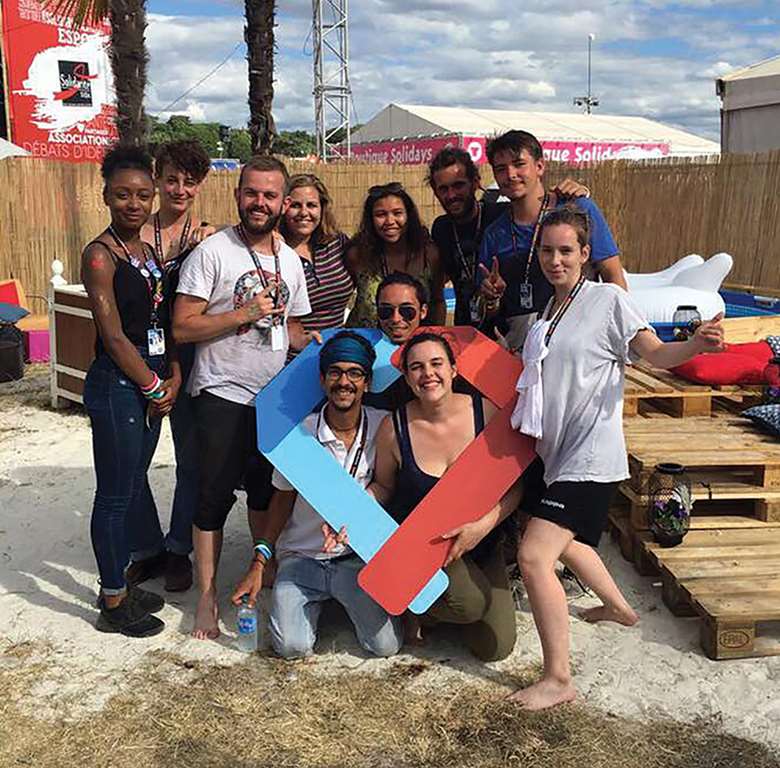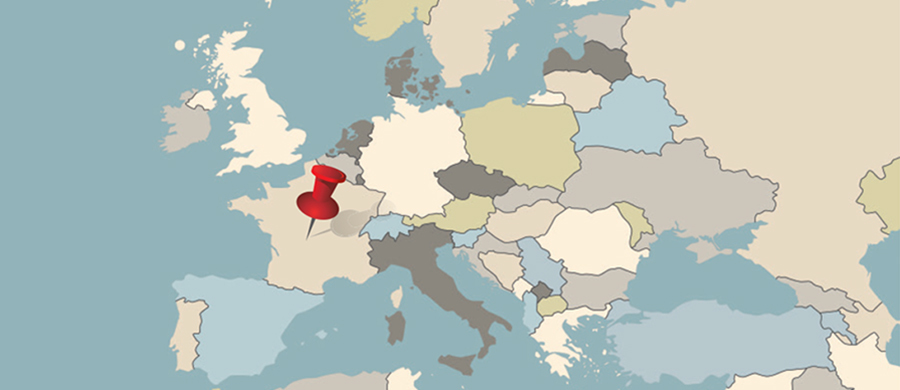Service Civique, France
Derren Hayes
Tuesday, July 31, 2018
Service Civique (SC) is the French national volunteer service. While it has some similarities in aims to the National Citizen Service in England, its scope is significantly wider.

The idea of some kind of voluntary service was supported by such prominent figures as l'Abbé Pierre, founder of deprivation charity Emmaus, who suggested that governments in all countries should send an appeal to the young people for voluntary service, similar to military service, but to "accomplish peace-building tasks".
Jean Marc Ayrault, former mayor of Nantes, described Service Civique as "an act of trust in the young" when it was launched in early 2010.
SC is accessible to any French national aged 16 to 25 who can commit to carrying out a community assignment for a minimum of six months. In return, they receive an allowance of around €500 (£446) a month, 80 per cent covered by the state, and accrue rights such as having social security paid for by the government.
Volunteers are assigned to work in a number of sectors and a range of programmes including health, humanitarian action, solidarity work, environmental protection, citizenship, youth work and education, defence and the arts.
Some programmes are also carried out overseas, particular with aid projects. The ultimate aim is to reinforce national cohesion and social diversity.
CULTURE AND SOCIETY
France has a long history of youth volunteering. Compulsory military service only ended in 1996, replaced by the Preparation and Call to Defence Day in 1998. This one-day compulsory programme for 16- to 18-year-olds dealt with citizenship, awareness of defence and the nation. In 2010, it was renamed Defence and Citizenship Day, and the age range expanded to 17- to 25-year-olds.
Traditional forms of youth work have long been intended to act as contributors to social cohesion, along with mainstream formal education and other education and employment programmes. Social mixing has become a key issue as mass immigration of people from former French colonies in the latter half of the 20th century saw France become a more multi-cultural society.
As in the UK, racial tensions fuelled by inequality and poor living and employment levels in non-white communities resulted in social unrest and a number of riots in Paris and other major cities. When violence erupted in the Paris suburbs in November 2005, it led to former president Jacques Chirac declaring that it was the responsibility of the Republic "to offer the same chance to everyone everywhere". Shortly after, Chirac set up Voluntary Service Civique, the forerunner to SC, as a new scheme to complement other existing forms of voluntary involvement/engagement of French youth.
REGULATION AND POLICY
The 2006 Equal Opportunities Act set out the government's ambitions to promote equal opportunities. It is comprised of five areas: education measures, employment and economic development, measures to fight discrimination and the creation of the Voluntary Service Civique. It also created ACSe, the national agency for social cohesion and equal opportunities, which was handed responsibility for co-ordinating SC.
A 2008 report into the viability of SC recommended the programme be made available to 60,000 young people with the following three objectives: to re-evaluate their sense of duty, to encourage social diversity and to offer a useful experience that helps promote personal talents and the meaning of community work.
In March 2010, SC was enacted into French law alongside Defence and Citizenship Day. SC was officially launched on 14 May 2010.
Despite the aspirations of Chirac, youth unemployment in France remains high. How high depends on how you measure it: European statistics agency Eurostat reports that one in four young people in France were not in education, employment or training in 2016, but the government's statistics put the rate at 9.1 per cent, a little higher than the UK's 7.6 per cent.
PARTICIPATION AND FUNDING
Anyone within the age range can participate in SC, whatever their education or qualification level - 60 per cent have qualifications at or below baccalaureate (A-Level) standard, which is representative of education levels nationally.
Host organisations register with SC with details of their projects, with these being evaluated against national objectives before volunteers are approved. Organisations are approved for a two-year period. All approved host organisations must have committed to helping participants without baccalaureate level qualifications to get vocational training. Young people can then register online to participate in the programme and apply for volunteer positions.
The majority of participants in SC are female, opening up voluntary service to a section of the population that had previously been exempt from military service.
There is a commitment to promoting diversity and encouraging young people with disabilities to participate. Initial analysis of the programme found around one in five participants lived in deprived areas.
The most popular assignments are solidarity (28 per cent), education for all (18.4 per cent), culture and leisure (15 per cent) and environment (12.5 per cent).
There are about 3,000 approved organisations that host volunteers. More than half host one volunteer, with 1,073 hosting between two and five, and 267 hosting between six and 20. A further 70 organisations host between 21 and 100 volunteers, 14 host between 101 and 1,000, and two host more than 1,000 each year. Most host organisations are small associations, but larger voluntary organisations and local authorities also offer SC volunteer placements.
Young people cannot volunteer for companies to avoid jobs being affected by the scheme. For all volunteers, a first aid course is included in SC training and systematically offered by host organisations.
In 2018, SC's provisional budget is €447m (£399m), up from €300m in 2016. In comparison, state funding for voluntary youth and community organisations rose from €90m to €93m.
IMPACT
Once the placement is completed, volunteers receive a CS certificate and an official report that documents their journey, detailing achievements and skills developed during the assignment. The host organisation also has responsibility for assisting the young person in their long-term goals and ambitions.
In the first two years of the programme, the number of participants reached 25,000.
Post-programme satisfaction surveys show that 91 per cent of participants have a "positive" or "very positive" experience, with 89 per cent reporting they would recommend the experience.
In 2014, the number of participants had increased to 35,000, but the government has set an ambitious target of reaching 10 times that level of participants by 2018.
Just as with the NCS in England, some have criticised the amount of public funding going to the SC and the benefit it is having for disadvantaged young people.
Critics say that the fact just a quarter of volunteers are those who have struggled in education shows it is not reaching those who can most benefit.
A report by the Court of Auditors in 2014 highlighted the risks of rapid scaling up of the programme and the lack of checks on approved organisations.
Others have highlighted how SC has become a vehicle for work placements for graduates from youth work and other social science courses.
While this offers work experience for graduates, there are concerns that it is creating a cheap labour force at the expense of full-time jobs in non-profit organisations as well as in the public sector.

FACTFILE
- National programme sees young people aged 16 to 25 volunteer full time for at least six months
- They can take part in projects run by a range of organisations across the public and voluntary sectors
- The programme aims to harness a national commitment to social action among young people
- It aims to improve employment and training opportunities for disadvantaged young people
- 35,000 young people had taken part by 2014, well short of the 350,000 target by 2018
- Critics have warned it is failing to reach disadvantaged young people and improve opportunities
CRITICAL ANALYSIS
In a recent book on the impact of youth work in Europe, Marc Carletti and Christophe Dansac, two academics at Toulouse Jean-Jaurès University (IUT Figeac), discuss the impact of Service Civique: "The most remarkable tendency in the past 10 years has been the powerful national incentives to draw unemployed and unskilled young people into volunteering as the best means to keep youth unemployment rates stable, while enhancing employability and hopefully limiting radicalisation and extremism. To this aim, the Service Civique programme has become one of the top funding priorities, at the expense it is feared, of some of the more traditional voluntary sector organisations (mouvements de jeunesse et d'éducation populaire). Central-government expenditure on Service Civique alone in 2015 was €150m and has risen to €300m in 2016. This compares to a total of €390m devoted to the whole youth and voluntary sector in 2016. Service Civique spending is expected to rise by 2018, which raises concerns about the effect on the future funding of traditional forms of youth work."
- Marc Carletti is presenting at the Transformative Youth Work Conference at Plymouth Marjon University, 4-6 September 2018




